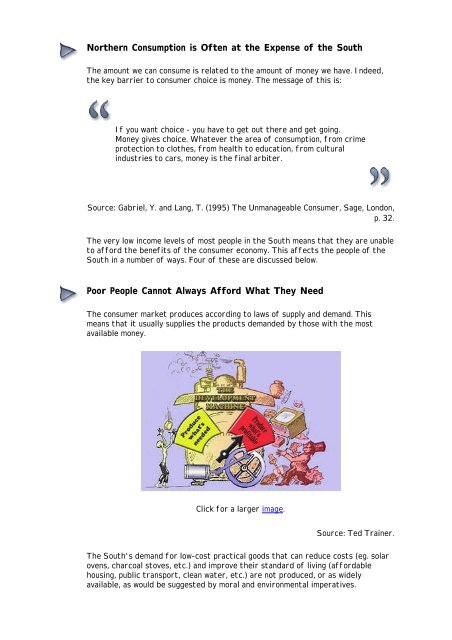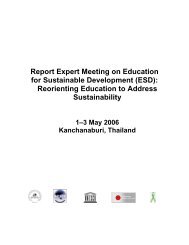Module 9 Consumer education - APCEIU
Module 9 Consumer education - APCEIU
Module 9 Consumer education - APCEIU
Create successful ePaper yourself
Turn your PDF publications into a flip-book with our unique Google optimized e-Paper software.
Northern Consumption is Often at the Expense of the South<br />
The amount we can consume is related to the amount of money we have. Indeed,<br />
the key barrier to consumer choice is money. The message of this is:<br />
If you want choice - you have to get out there and get going.<br />
Money gives choice. Whatever the area of consumption, from crime<br />
protection to clothes, from health to <strong>education</strong>, from cultural<br />
industries to cars, money is the final arbiter.<br />
Source: Gabriel, Y. and Lang, T. (1995) The Unmanageable <strong>Consumer</strong>, Sage, London,<br />
p. 32.<br />
The very low income levels of most people in the South means that they are unable<br />
to afford the benefits of the consumer economy. This affects the people of the<br />
South in a number of ways. Four of these are discussed below.<br />
Poor People Cannot Always Afford What They Need<br />
The consumer market produces according to laws of supply and demand. This<br />
means that it usually supplies the products demanded by those with the most<br />
available money.<br />
Click for a larger image.<br />
Source: Ted Trainer.<br />
The South's demand for low-cost practical goods that can reduce costs (eg. solar<br />
ovens, charcoal stoves, etc.) and improve their standard of living (affordable<br />
housing, public transport, clean water, etc.) are not produced, or as widely<br />
available, as would be suggested by moral and environmental imperatives.








